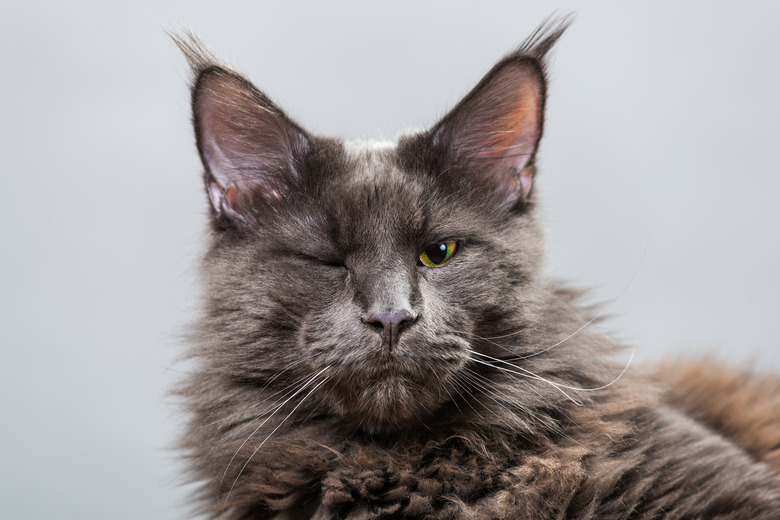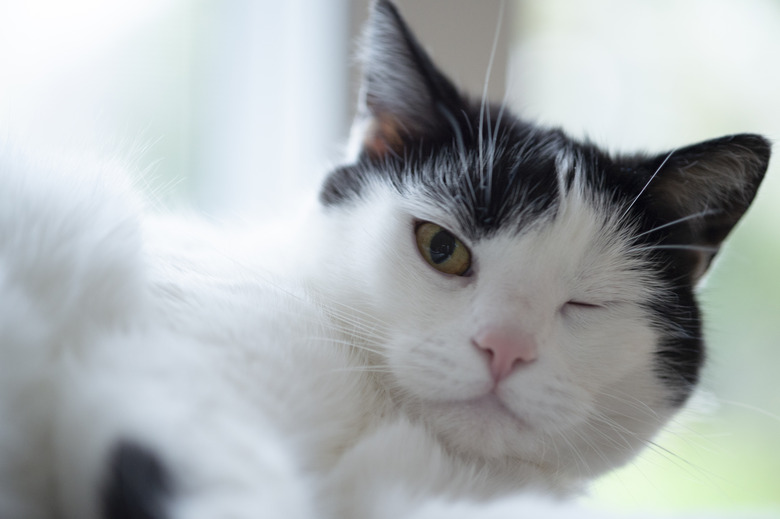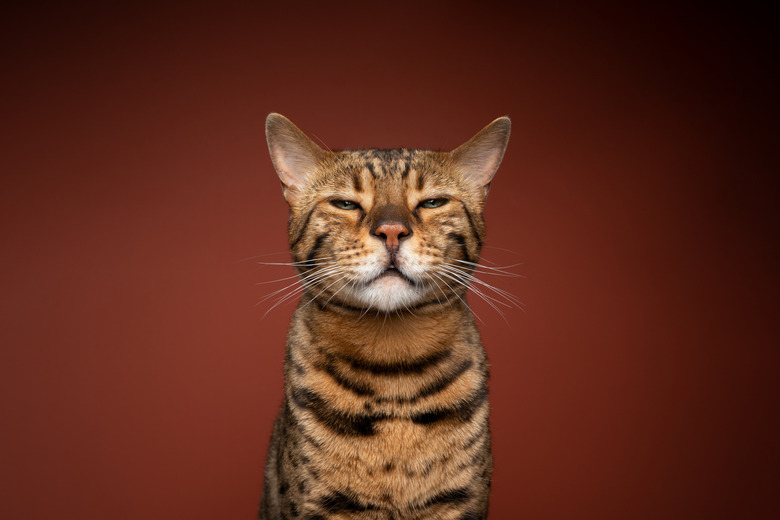Why Does My Cat Wink At Me?
Despite their lack of eyebrows, cats have expressive faces. If you share your home with a cat, you've probably learned to interpret some of their facial expressions as contentment, surprise, or annoyance. Most cat owners are familiar with the squinty eyes and slow blinks that indicate a happy cat. Though what does it mean when a cat winks at you?
Cats communicate with their eyes
Cats communicate with their eyes
Cats use almost every part of their bodies to communicate. Tail swishing, flattened ears, and squinty eyes all serve to tell another animal or human how a cat is feeling. Cats can be difficult to read, but with some practice, you can learn to interpret their body language.
Though we associate squinted eyes with uncertainty or irritation in humans, this facial expression can indicate contentment and relaxation in cats. A cat's pupils can also say a lot about their mood. Large, dilated pupils show that your cat is alert and taking in their surroundings. This is a physical response to stimulation of some kind: the pupils dilate to allow more light into the eye, which helps the eyes to see better, and the brain to process information more quickly. In both cats and humans, pupils dilate in bright light as well as in response to chemical changes in the body — such as fear or excitement.
When a cat does the slow blink
When a cat does the slow blink
Cats often use a slow blink to show contentment. This cat behavior is well-known, but questions as to why cats do this have prompted some interesting scientific studies. A 2020 study examined how cats use their eyes to communicate with humans. Researchers instructed human participants to adopt either a neutral expression or make an attempt to engage a cat with a slow blink. They observed the feline participants' responses to meeting strange humans and found that cats were more likely to approach the person who gave a slow blink than the person with a neutral expression.
Animal behaviorists are not certain if the slow blink is an instinctual or learned behavior. Tasmin Humphrey, the lead researcher in the 2020 study, suggested theories for both possibilities. He theorized that, if instinctual, slow blinking in cats may have begun as a way to interrupt an unbroken stare — which can be threatening in social interactions. If it is a learned behavior, cats may have developed a slow blink because they learned that humans viewed it as positive. They may associate this behavior with a reward, such as a treat or affection.
Why does my cat wink?
Why does my cat wink?
Slow blinking and squinting are easy enough to recognize as signs of a happy cat, but what about winking? While scientists haven't yet studied why cats wink, there are a couple of likely explanations for this behavior. Winking can be caused by a piece of dust in a cat's eye, and they will blink the affected eye to try and dislodge the object. A cat will also wink if one eye is injured. Even a minor scratch on the eye can be painful and irritating, and the eye will produce more tears — which can mean more blinking in one eye. If you notice your cat winking many times in a row, or throughout the course of the day, check their eyes for injuries or debris. Winking can also be a sign of more serious ailments, such as an infection or corneal ulcer. Occasional winking isn't anything to be concerned about, but if you notice lots of winking accompanied by other symptoms (such as eye discharge, a weepy eye, or head shaking) be sure to get in touch with your vet.
It's possible that cats wink to show happiness, similarly to a slow blink, but behaviorists can't say for certain. If you notice your cat doing a slow wink while happily laying in a sunbeam, it may well be a sign of contentment. Humans might interpret this eye movement as a cat winking "at" us to communicate in some way, but it could simply be coincidental timing — your cat is staring at you, you make eye contact with them, and then notice a wink.
In summary
In summary
Cats often communicate with their eyes. A slow blink or a squint is usually a sign of a contented cat, while wide eyes can indicate excitement or nervousness. Cats will wink if one eye is irritated by debris or an injury, and excessive winking accompanied by other symptoms might be a sign of infection. Winking may be another way cats communicate their moods to us, but feline behaviorists can't say for sure.
References
- Cats Do Have Facial Expressions, But You Probably Can't Read Them
- How Your Eyes Respond to Stress
- The Role of Cat Eye Narrowing Movements in Cat–Human Communication
- What Blinking Slowly Means to Cats, According to Science
- Study Confirms 'Slow Blinks' Really Do Work to Communicate With Your Cat
- What Does it Mean if a Cat Winks at You?


